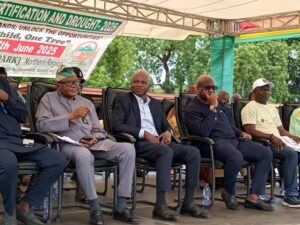…. with call for responsible and restoration of degraded lands
By Samuel SAM
This year’s World Day to Combat Desertification and Drought to contribute to national restoration and climate change resilience efforts has been held in Tamale with a call for responsible use and restoration of degraded lands and environment.
Under the theme ‘Restore the land, unlock the opportunities and nation one child, one tree’ the initiative is spearheaded by the Ministry of Environment, Science, Technology and Innovation in collaboration with the Environmental Protection Agency (EPA) to empower every child in Ghana to plant and nurture a tree by instilling a culture of environmental stewardship from a young age.

World Desertification and Drought day is officially declared by the United States to promote public awareness and the need to enhance efforts to combat desertification.
It is also aimed to educate the public and create awareness about the causes and effects of land degradation, desertification and drought, and to showcase efforts to combat these issues.
The sector minister, Mr. Ibrahim Murtala Muhammed, said the five regions of the north had suffered increasing pressure on land from deforestation, overgrazing, unsustainable farming practices and climate change, degrading the soil and limiting the future potential of the environment and the economy.
“Our lands can be healed when we unlock the opportunities for agriculture, jobs, carbon capture, water conservation and sustainable livelihoods,” he said.
To combat the issues in Ghana, he said government has developed a number of policies like the National Climate Change policy, the Land Degradation and Neutrality Action Plan, National REED+ strategy, national drought plan, climate smart agriculture, National Biodiversity Strategy and Action, among others, to help restore the degraded landscapes.
For example the Modified Taunya System allows communities to plant food crops with trees on degraded forest reserves, combining food security with reforestation; Agroforestry and Farmer-Managed Natural Regeneration empowers farmers to regenerate tree stumps and integrate trees into farms for soil fertility and shade while the Ghana Forest Plantation Strategy targets the planting of 625,000 hectares of forest plantations by 2040 – a major contributor to land restoration and climate mitigation.
The water harvesting systems, such as small dams and contour bunds, are helping communities in the Upper East and Upper West Regions to reduce the impact of drought and support dry-season farming, he added.
He added that Ghana has joined the Global Shield African Risk Capacity initiative as a member of the Climate Vulnerable Forum (CVF) to consider providing drought insurance policy to drought-related disasters, and each of the initiatives is a seed of restoration not just of the environment, but of hope, dignity and opportunity.
“With the ‘One Child, One Tree’ initiative, every seedling planted becomes a symbol of hope, resilience and renewal as well as forms green corridors to cool our climate, protect our watersheds and bring life back to barren lands,” he indicated.
“As we work toward restoration, we will be contributing to the achievement of target two of the Kunming-Montreal Global Biodiversity Framework, which focuses on restoration,” he added.
He further mentioned that Environmental sustainability remains a top priority for H.E John Mahama’s Government, the Ministry of Environment, Science and Technology is fully committed to ensuring that, environmental sustainability is anchored in our national development.
“As Minister of Environment and MP for Tamale Central I have requested the Northern Regional EPA office to ensure that trees are planted in every school in this constituency and same should be done across the country,” he said.
Northern Regional Minister Ali Adolf John called on businesses and investors to support the green job and land restoration interventions as part of corporate social responsibility.
He also advised school children, traditional authorities and citizens to support the government’s agenda by planting trees and helping to protect them for future purposes.
Director/Head of Climate Change and Ozone – EPA, Mr. Felix Addo-Okyire, said the urgent need to restore lands and unlock the vast opportunities lie in the heritage ecosystem.
According to the United Nations Convention to Combat Desertification (UNCCD), approximately 1 million square kilometres of protected land is degraded every year, affecting 1.3 billion people globally and nearly 1.84 billion people living in drought-affected areas, with 1.4 percent exposed to severe or extreme drought conditions. He cited Nigeria, where the situation is quite urgent.
He further explained that it is estimated that over 35 percent of lands have been affected due to desertification, unsustainable land use and impact of climate change. These issues threaten not only our ecosystems, but also the livelihood of millions of Ghanaians, especially in the northern regions.
This year’s theme is a reminder that land restoration is not just a matter of imperative, but it is a pathway to economic resilience, food security and sustainable development.










